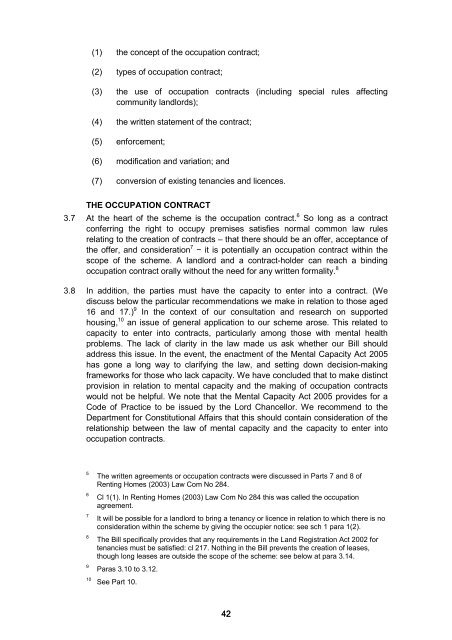Renting Homes: The Final Report - Law Commission
Renting Homes: The Final Report - Law Commission
Renting Homes: The Final Report - Law Commission
You also want an ePaper? Increase the reach of your titles
YUMPU automatically turns print PDFs into web optimized ePapers that Google loves.
(1) the concept of the occupation contract;<br />
(2) types of occupation contract;<br />
(3) the use of occupation contracts (including special rules affecting<br />
community landlords);<br />
(4) the written statement of the contract;<br />
(5) enforcement;<br />
(6) modification and variation; and<br />
(7) conversion of existing tenancies and licences.<br />
THE OCCUPATION CONTRACT<br />
3.7 At the heart of the scheme is the occupation contract. 6 So long as a contract<br />
conferring the right to occupy premises satisfies normal common law rules<br />
relating to the creation of contracts – that there should be an offer, acceptance of<br />
the offer, and consideration 7 − it is potentially an occupation contract within the<br />
scope of the scheme. A landlord and a contract-holder can reach a binding<br />
occupation contract orally without the need for any written formality. 8<br />
3.8 In addition, the parties must have the capacity to enter into a contract. (We<br />
discuss below the particular recommendations we make in relation to those aged<br />
16 and 17.) 9 In the context of our consultation and research on supported<br />
housing, 10 an issue of general application to our scheme arose. This related to<br />
capacity to enter into contracts, particularly among those with mental health<br />
problems. <strong>The</strong> lack of clarity in the law made us ask whether our Bill should<br />
address this issue. In the event, the enactment of the Mental Capacity Act 2005<br />
has gone a long way to clarifying the law, and setting down decision-making<br />
frameworks for those who lack capacity. We have concluded that to make distinct<br />
provision in relation to mental capacity and the making of occupation contracts<br />
would not be helpful. We note that the Mental Capacity Act 2005 provides for a<br />
Code of Practice to be issued by the Lord Chancellor. We recommend to the<br />
Department for Constitutional Affairs that this should contain consideration of the<br />
relationship between the law of mental capacity and the capacity to enter into<br />
occupation contracts.<br />
5 <strong>The</strong> written agreements or occupation contracts were discussed in Parts 7 and 8 of<br />
<strong>Renting</strong> <strong>Homes</strong> (2003) <strong>Law</strong> Com No 284.<br />
6<br />
Cl 1(1). In <strong>Renting</strong> <strong>Homes</strong> (2003) <strong>Law</strong> Com No 284 this was called the occupation<br />
agreement.<br />
7<br />
It will be possible for a landlord to bring a tenancy or licence in relation to which there is no<br />
consideration within the scheme by giving the occupier notice: see sch 1 para 1(2).<br />
8 <strong>The</strong> Bill specifically provides that any requirements in the Land Registration Act 2002 for<br />
tenancies must be satisfied: cl 217. Nothing in the Bill prevents the creation of leases,<br />
though long leases are outside the scope of the scheme: see below at para 3.14.<br />
9 Paras 3.10 to 3.12.<br />
10 See Part 10.<br />
42

















